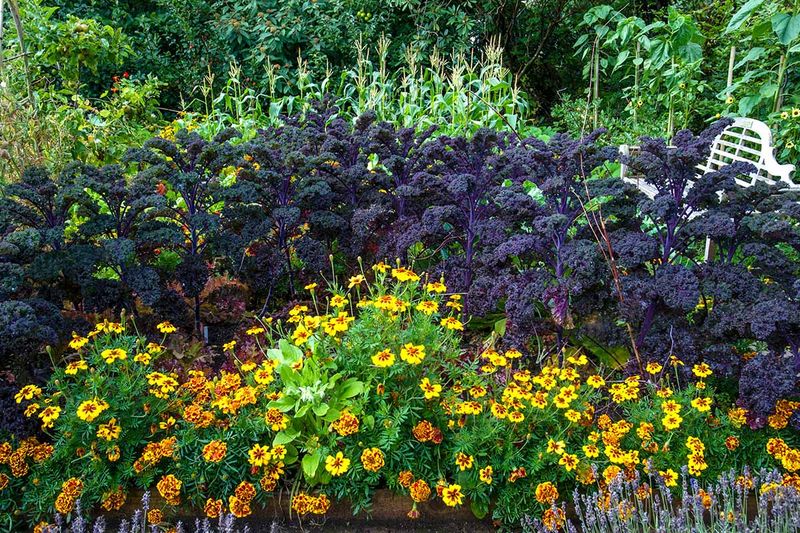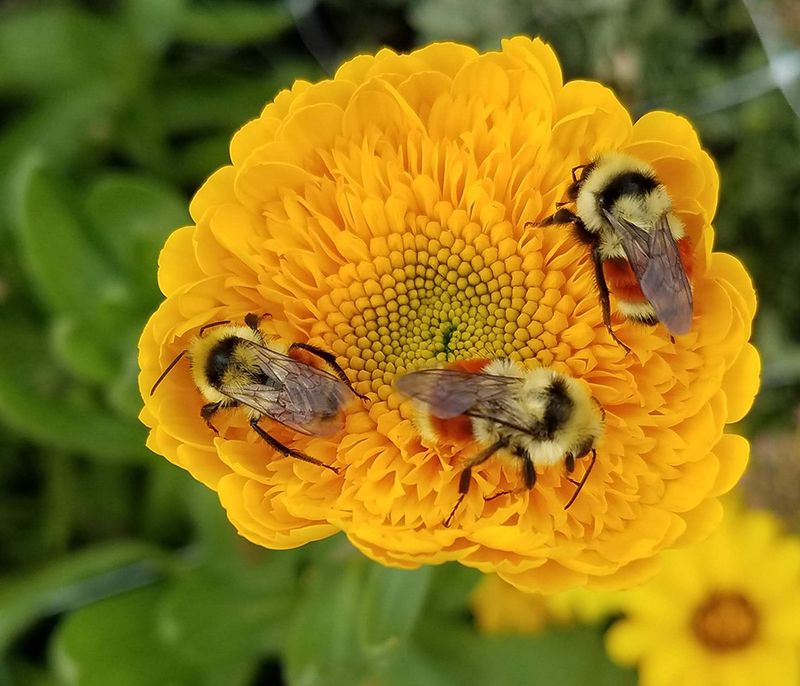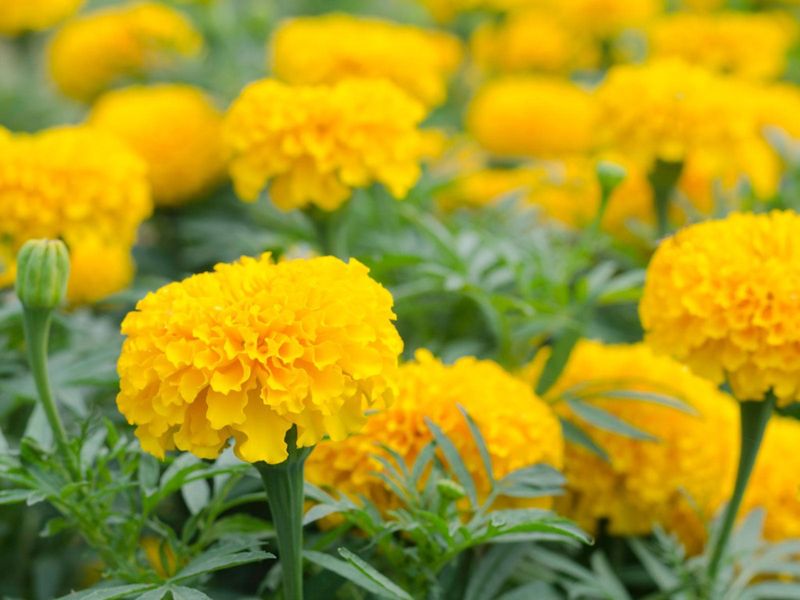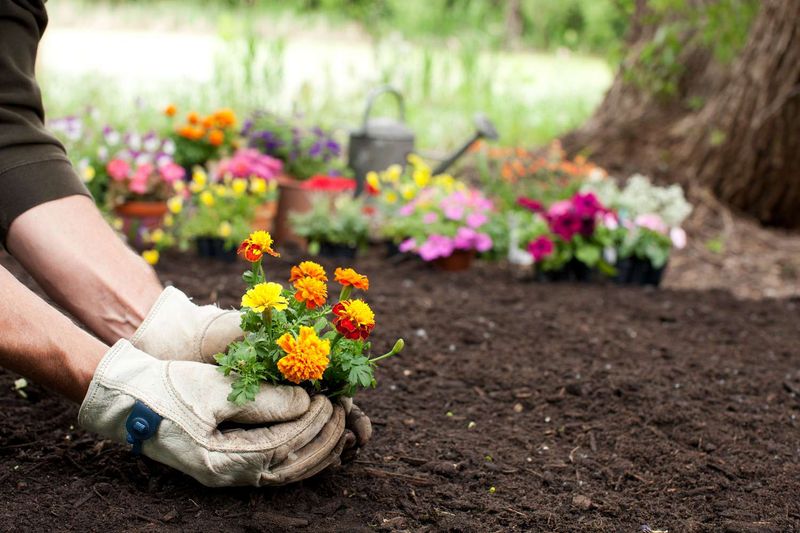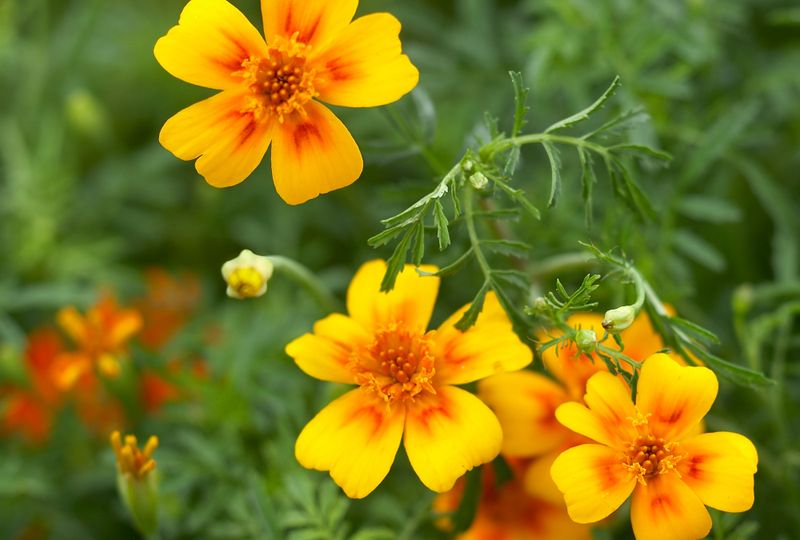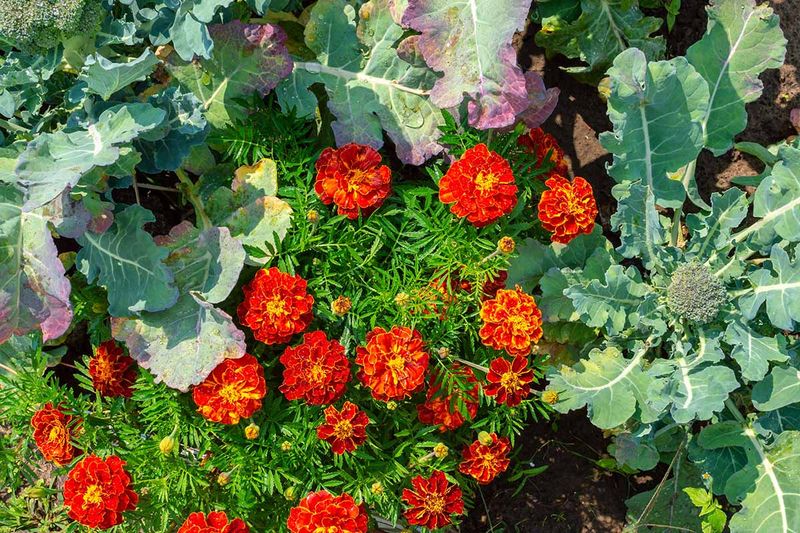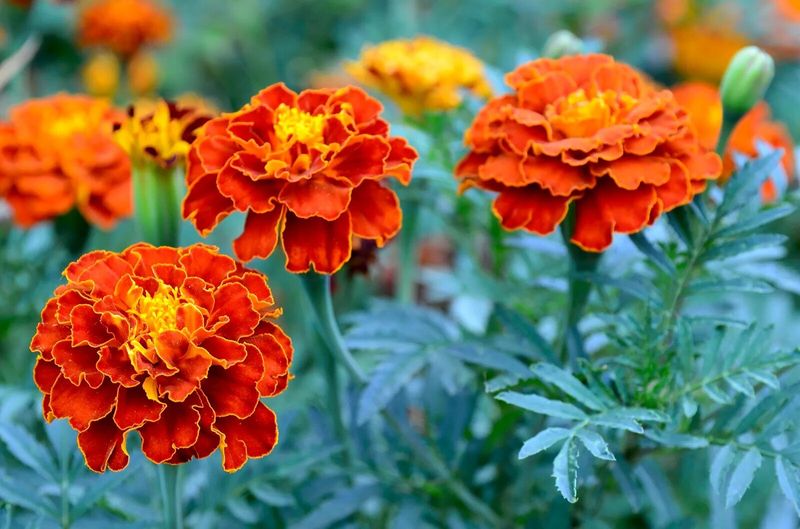Marigolds are not only a vibrant addition to any garden but also offer a multitude of benefits to seasoned and novice gardeners alike.
Known for their bright, golden blooms and distinctive scent, these flowers are more than just ornamental.
They serve functional purposes that can significantly enhance the gardening experience.
1. Natural Pest Repellent
Marigolds are known for their natural pest-repelling properties. The distinct scent of marigold flowers acts as a deterrent to many common garden pests, such as aphids, nematodes, and even rabbits.
By planting marigolds alongside your vegetables, you can reduce the need for chemical pesticides, promoting a healthier garden environment. These flowers release compounds that can inhibit the growth of harmful nematodes in the soil.
Their presence can create a protective barrier around your plants, ensuring a robust and flourishing garden. This eco-friendly method is both effective and beautiful.
2. Attracts Pollinators
Marigolds are excellent for attracting pollinators such as bees and butterflies to your garden. Their bright colors and simple, open structure make them easy targets for these beneficial creatures.
Pollinators are crucial for the success of many flowering plants and vegetables, assisting in the production of fruits and seeds. By having marigolds in your garden, you can enhance pollination rates and improve crop yields.
This symbiotic relationship not only benefits your garden but also supports the local ecosystem, promoting biodiversity and natural beauty.
3. Easy to Grow
Marigolds are incredibly easy to grow, making them perfect for gardeners of all skill levels. These resilient plants thrive in a variety of soil types and are tolerant of both heat and drought.
Their low maintenance nature means they require minimal care once planted, needing only regular watering and occasional deadheading to encourage blooming. Beginners will find success with marigolds, as they germinate quickly and reliably.
This ease of cultivation allows gardeners to enjoy vibrant blooms without the hassle, making marigolds a convenient choice for any garden.
4. Adds Vibrant Color
Marigolds are famous for their vibrant colors, adding a splash of orange, yellow, and red to any garden. Their bright and cheerful blooms can uplift the aesthetic of your garden space instantly.
These flowers can be strategically planted to create striking borders or mixed with other plants for a harmonious look. They bloom profusely over the growing season, providing continuous color and interest.
The vivid hues of marigolds can complement other flowers and foliage, making them a versatile choice for enhancing garden design.
5. Improves Soil Health
Marigolds contribute to improved soil health through their root structures and natural chemical production. Their roots release substances that can suppress harmful soil nematodes, which can damage plant roots.
By including marigolds in crop rotations, gardeners can naturally improve soil quality without synthetic additives. The decomposition of marigold plants adds organic matter to the soil, enhancing its fertility and structure.
This natural method of soil improvement is both sustainable and effective, helping to maintain a healthy growing environment for future plantings.
6. Diverse Varieties Available
Marigolds come in a diverse range of varieties, offering gardeners multiple choices in terms of size, color, and form. From the petite French marigolds to the larger African marigolds, there is a type to suit any garden need.
This variety allows gardeners to choose plants that fit specific landscape designs, whether it’s for edging, mass planting, or container gardening. Each variety has unique characteristics but shares the common benefit of easy cultivation.
This diversity ensures that marigolds can be used creatively, providing endless possibilities for garden aesthetics.
7. Companion Planting Benefits
Marigolds are excellent companions in the vegetable garden, providing numerous benefits to nearby plants. Their ability to repel pests like nematodes and aphids helps protect vegetables from damage.
When planted alongside crops like tomatoes and peppers, marigolds can enhance growth and productivity by reducing competition with weeds and attracting beneficial insects. This practice, known as companion planting, improves garden ecology.
The natural synergy between marigolds and vegetables can lead to healthier, more productive gardens with less reliance on chemical interventions.
8. Fragrance and Beauty
The fragrance of marigolds is distinctive and can add an aromatic element to your garden. Their scent is fresh and somewhat spicy, providing a sensory experience beyond just visual appeal.
Marigolds’ beauty goes beyond their vibrant colors, as their petal texture and form add depth to garden designs. The flowers can be used in bouquets and arrangements, bringing the outdoors inside.
This combination of fragrance and aesthetic appeal makes marigolds a multifaceted addition to any garden, enriching it with both scent and sight.
9. Drought Tolerance
Marigolds are highly drought-tolerant, making them ideal for gardens in dry or arid regions. Their ability to thrive with minimal water ensures they remain a vibrant part of the landscape even during dry spells.
This characteristic reduces the need for frequent watering, conserving resources and saving time. Marigolds’ resilience helps maintain garden vitality, even in challenging weather conditions.
By choosing marigolds, gardeners can enjoy blooms that endure through periods of low rainfall, ensuring a lively garden throughout the season.
10. Affordable and Accessible
Marigolds are affordable and easily accessible, making them a practical choice for gardeners on a budget. Seeds and plants are widely available at garden centers and nurseries, both online and offline.
Their low cost allows gardeners to fill large spaces without a significant financial investment. Marigolds’ popularity means they are always in stock, making them a reliable option for seasonal planting.
This affordability and accessibility ensure that everyone can enjoy the benefits of marigolds, regardless of budget constraints, promoting inclusive gardening practices.
11. Medicinal Uses
Marigolds have been used in traditional medicine for their therapeutic properties. They contain compounds like flavonoids that have anti-inflammatory and antiseptic effects.
These properties make marigolds useful in soothing skin irritations, wounds, and insect bites. Marigold extracts are often found in topical creams and ointments.
While not a substitute for professional medical advice, incorporating marigolds into home remedies can offer natural relief for minor ailments. Their medicinal uses add another layer of utility to this already versatile plant.
12. Supports Biodiversity
Marigolds play a role in supporting garden biodiversity by attracting a variety of insects and birds. Their presence helps sustain a balanced ecosystem, promoting the health of other plants and animals.
By providing nectar and pollen, marigolds support pollinators, which are crucial for plant reproduction. They also offer habitat and food sources for beneficial insects like ladybugs.
This contribution to biodiversity strengthens the resilience of the garden environment, creating a thriving, self-sustaining space for wildlife and flora alike.

